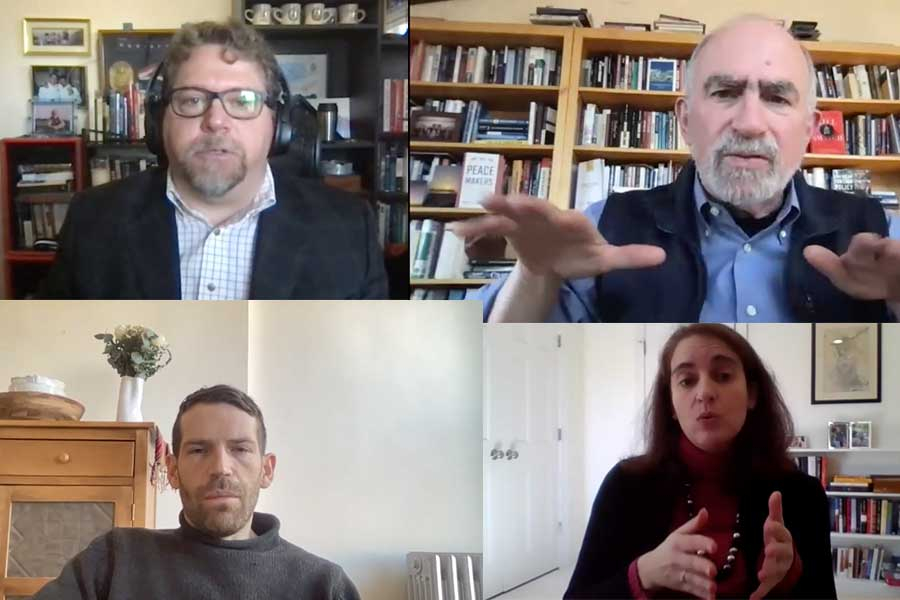IPSCON Hosts Panel on Publishing in Policy and Academia

The Kissinger Center for Global Affairs hosted prominent publishers for a discussion on writing and publishing with PhDs in its IPSCON program. The panel included:
Doyle Hodges is the Executive Editor at the Texas National Security Review. He earned a doctorate in security studies from Princeton’s Woodrow Wilson School of Public and International Affairs in 2018. A retired naval officer, his research interests include civil-military relations, ethics in international affairs, military technology and innovation, and grand strategy. Prior to joining the Texas National Security Review, he taught at the United States Naval War College in Newport, Rhode Island. He has also served as a visiting research fellow in the Stockdale Center for Ethical Leadership at the United States Naval Academy in Annapolis, Maryland.
Bruce W. Jentleson is a Senior Scholar in our IPSCON program and an Editor of the Bridging the Gap Series with Oxford University Press. He is the William Preston Few Professor of Public Policy and Professor of Political Science at Duke University, where he previously served as Director of the Terry Sanford Institute (now Sanford School) of Public Policy. In 2015-16 he was the Henry A. Kissinger Chair in Foreign Policy and International Relations at the John W. Kluge Center, Library of Congress. He received the 2018 American Political Science Association (APSA) International Security Section Joseph J. Kruzel Award for Distinguished Public Service. In 2020 he will be the Desmond Ball Visiting Professor at Australia National University, College of Asia and the Pacific, and Visiting Professor, Barcelona Institute of International Studies (IBEI). You can read his full bio here.
Daniel Kurtz-Phelan is Editor of Foreign Affairs. He previously spent three years as Executive Editor of the magazine and served in the U.S. State Department, including as a member of the Secretary of State’s Policy Planning Staff. His narrative history of George Marshall’s post–World War II missionto China, The China Mission, was published by WW Norton in 2018 and named a best book of the year by The Economist and an editor’s pick by The New York Times Book Review. His writing has also appeared in publications including The New York Times, The Washington Post, and The Atlantic.
Elizabeth Saunders is an editor and contributor to the Washington Post Monkey Cage blog and Associate Professor in the School of Foreign Service and a core faculty member in the Security Studies Program at Georgetown University. Previously, she was an Associate Professor in the Department of Political Science at George Washington University. Her research and teaching interests focus on the domestic politics of international relations and US foreign policy, especially the role of leaders, the presidency, and the politics of using force. Her book, Leaders at War: How Presidents Shape Military Interventions, was published by Cornell University Press in 2011, and received the 2012 Jervis-Schroeder Best Book Award from APSA’s International History and Politics section. Her work has been published in International Organization, International Security, World Politics, International Studies Quarterly, Security Studies, the Journal of Conflict Resolution, the American Journal of Political Science, International Studies Review, and Foreign Affairs. She is currently working on her second book manuscript, The Insiders’ Game: Elites, Democracies, and War, which argues that elites, rather than voters, are the main audience for foreign policy decisions in democracies. Her current research also examines other aspects of the politics of foreign policy, including how leaders interact with advisers, the role of diplomacy in US foreign policy, and the domestic politics of nuclear choices. She is a non-resident senior fellow at the Brookings Institution.
This panel was part of the Carnegie Squares Seminar Series for members of the IPSCON program, a project funded by the Carnegie Corporation of NY, that seeks to bridge the policy-academy divide. If you are interested in learning more about IPSCON, visit the IPSCON webpage here.